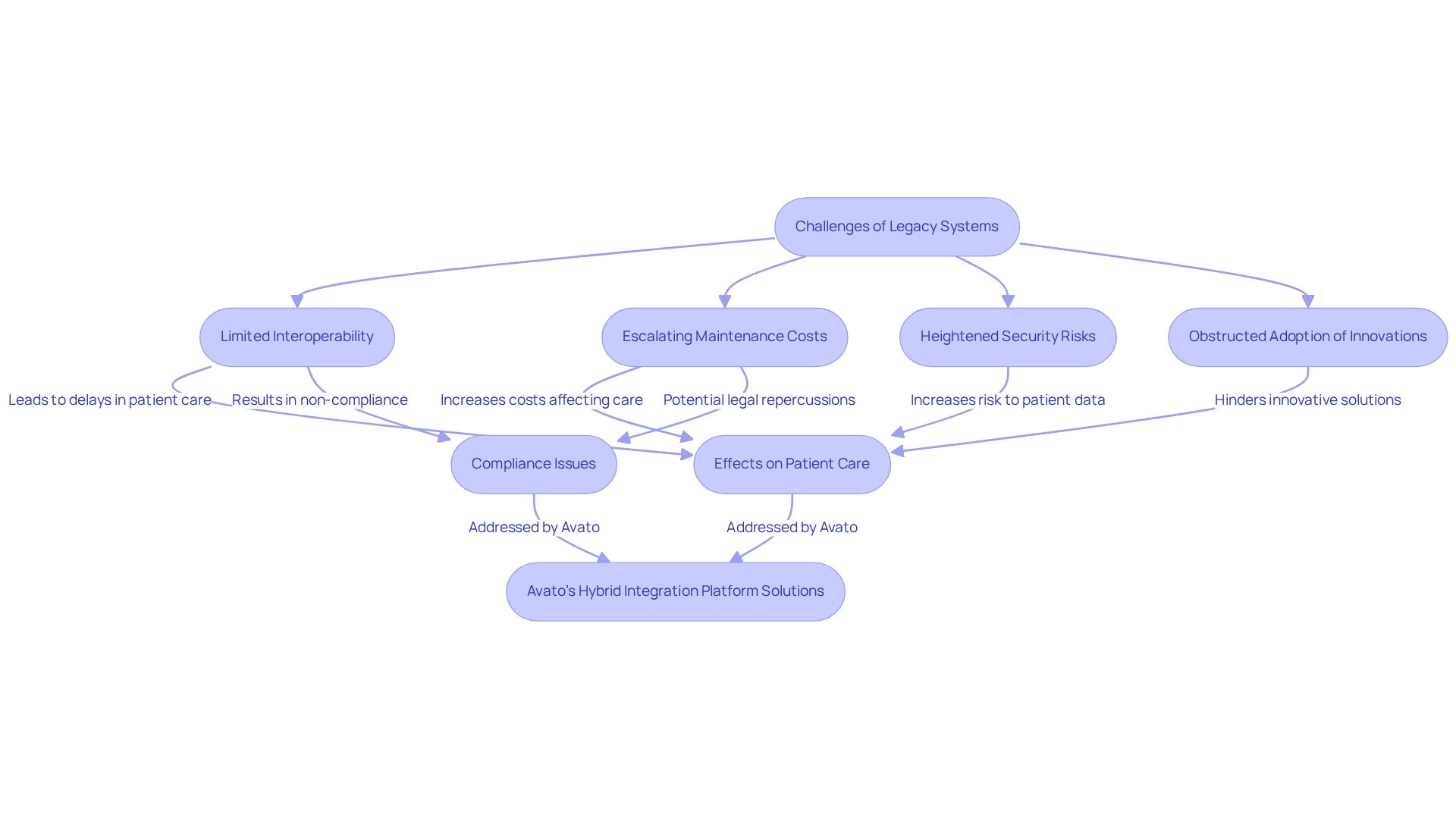Overview
Legacy systems in healthcare represent outdated technologies, including older electronic health records and medical devices, which significantly hinder our operational efficiency and patient care. What if we told you that 76% of hospitals still rely on these systems? This reliance leads to increased maintenance costs, security vulnerabilities, and formidable challenges in modernizing healthcare operations. As a result, it becomes imperative to address these issues head-on.
We must prioritize the integration of modern solutions to enhance interoperability and ensure robust vendor support. The time to act is now—let’s work together to transform our healthcare systems for the better.
Introduction
In the realm of healthcare, legacy systems stand as a formidable barrier to progress, often ensnaring organizations in outdated technologies that compromise both efficiency and patient care. These antiquated systems—ranging from electronic health records to billing software—not only lack the essential support and updates but also create silos that obstruct seamless data sharing.
With a staggering 76% of hospitals still reliant on these outdated technologies, the urgency for modernization becomes increasingly evident. The challenges posed by legacy systems extend beyond mere operational inefficiencies; they threaten compliance with evolving regulations and stifle the adoption of innovative solutions essential for enhancing patient outcomes.
We must recognize the pressing need for transformation and explore the potential solutions that can pave the way for a more integrated and responsive healthcare environment.
What’s holding your team back from embracing this change?
Defining Legacy Systems in Healthcare
In discussing what is a legacy system in healthcare, it is important to note that these frameworks represent a significant challenge, as outdated software, hardware, and processes persist despite the availability of advanced technologies. To understand what is a legacy system in healthcare, it is important to note that these systems often operate without vendor support, leading to a lack of crucial updates or security patches, which increases their vulnerability to threats.
For instance, older electronic health records (EHR), billing software, and medical devices struggle to connect with modern applications. Alarmingly, approximately 76% of hospitals continue to rely on these outdated platforms, highlighting what is a legacy system in healthcare and their pervasive presence in the industry. The impact of these antiquated technologies on medical operations is profound.
Consider the case of a major medical network that suffered a critical failure of its electronic health records due to a 15-year-old infrastructure, leaving providers unable to access essential patient histories and delaying medication administration. This incident highlights the urgent need for modernization, as 60% of medical institutions still depend on what is a legacy system in healthcare, which is increasingly difficult to manage and secure.
The escalating costs associated with what is a legacy system in healthcare, along with the lack of vendor support, further accentuate the necessity for improvements. Moreover, the absence of assistance for what is a legacy system in healthcare can lead to significant operational expenses and compliance risks, particularly in an environment where regulatory standards are in constant flux.
As we strive to enhance efficiency, bolster security, and ensure compliance, understanding what is a legacy system in healthcare is crucial for successful digital transformation initiatives. Our partners, such as Avato, leverage dedicated hybrid integration platforms and collaborate with managed service providers to streamline complex projects, delivering results within specified timelines and budget constraints, thus making modernization more achievable through their expert services.
By addressing these challenges, we can significantly enhance patient care and operational efficiency, paving the way for a more integrated and responsive healthcare framework. Additionally, services like KMS Healthcare’s Backlog Acceleration can assist organizations in optimizing the modernization of their systems, addressing what is a legacy system in healthcare, and further facilitating their transition to advanced technologies.
Challenges of Legacy Systems in Healthcare
What is a legacy system in healthcare refers to legacy infrastructures, which pose significant challenges for healthcare institutions, primarily due to limited interoperability, escalating maintenance costs, and heightened security risks. What is a legacy system in healthcare refers to these outdated systems that often function in isolation, creating barriers that obstruct seamless data exchange across departments. This fragmentation can delay patient care and adversely affect health outcomes. Furthermore, infrequent updates to these antiquated platforms can result in non-compliance with current regulatory standards, exposing organizations to potential legal repercussions.
Our reliance on outdated technology also obstructs the adoption of innovative solutions, such as telehealth and electronic prescribing, which are essential for enhancing patient care. As we approach 2025, the costs associated with maintaining these traditional platforms continue to rise, with many organizations dedicating a substantial portion of their IT budgets to outdated infrastructure instead of investing in modern, efficient technologies. Alarmingly, 90% of IT decision-makers acknowledge that what is a legacy system in healthcare hinders their organizations from leveraging digital technologies to innovate and improve operational efficiencies. Moreover, senior leadership often remains unaware of the daily challenges and hidden costs associated with legacy applications, complicating efforts to secure support for modernization initiatives. The case study titled ‘Making the Case for Modernization’ underscores the necessity for organizations to avoid the sunk cost fallacy and recognize that investing in new technologies can ultimately lead to better outcomes and reduced long-term expenses. To overcome these obstacles, it is crucial for healthcare institutions to prioritize long-term scalability in their technology solutions, ensuring adaptability to future demands and enhancement of patient care quality.
Avato’s Hybrid Integration Platform addresses these challenges by maximizing and extending the value of legacy infrastructures. We streamline complex integrations, enabling healthcare organizations to efficiently connect disparate systems and fragmented data. With features such as real-time monitoring and performance notifications, Avato significantly reduces costs while ensuring secure transactions, establishing our platform as a trustworthy choice for healthcare providers. By harnessing Avato’s capabilities, organizations can accelerate their integration efforts, paving the way for a more connected and efficient healthcare environment. Additionally, engaging stakeholders early in the process and designing new business processes can contribute to creating resilient systems, ensuring they remain adaptable to evolving healthcare needs.

Examples of Legacy Systems in Healthcare
What is a legacy system in healthcare creates a significant barrier to operational efficiency and patient care. Outdated technologies, such as [older Electronic Health Records](https://syscreations.com/modernize-legacy-healthcare-systems) (EHRs) that lack interoperability with modern platforms, billing solutions that do not support electronic claims processing, and antiquated medical imaging equipment that fails to integrate with contemporary diagnostic tools, contribute to this challenge. As we approach 2025, it is concerning that many hospitals still rely on EHR solutions developed over a decade ago, which often do not comply with current data standards like FHIR (Fast Healthcare Interoperability Resources).
Statistics reveal that a considerable portion of medical imaging equipment in hospitals is outdated, limiting their ability to connect with newer diagnostic technologies and thus compromising the quality of patient care. Additionally, legacy infrastructures often include aging hardware, such as outdated servers and networking tools, which pose security risks and operational inefficiencies.
Consider the case study of Tufts Medicine’s EHR platform migration, where the organization transitioned from over 800 outdated applications to a cloud-based solution. This migration, accomplished in just 14 months, successfully transferred 42 applications and 4 million patient records, leading to enhanced workflows and reduced IT infrastructure costs.
We recognize the challenges posed by what is a legacy system in healthcare, especially their inability to adapt to evolving medical needs. Medical facilities that rely on what is a legacy system in healthcare face significant hurdles in delivering high-quality patient care, underscoring the urgent need for medical entities to assess their technology landscape and embrace modernization strategies.
At Avato, we are committed to providing a hybrid integration platform that simplifies the merging of diverse networks. Our platform supports 12 tiers of interface maturity, enabling medical entities to efficiently upgrade their outdated frameworks. By unlocking isolated assets and enhancing business value, we play a pivotal role in this transformation.
As Gustavo Estrada noted, ‘Avato has the capability to streamline intricate projects and achieve outcomes within preferred timelines and financial limitations,’ which highlights the effectiveness of our solutions in addressing the challenges posed by what is a legacy system in healthcare. Furthermore, with 71% of digitized organizations leveraging APIs from third parties, the shift towards modernization and integration solutions in healthcare is more critical than ever.
Conclusion
The challenges posed by legacy systems in healthcare are profound. Outdated technologies hinder operational efficiency, compromise patient care, and escalate costs, all while creating silos that obstruct seamless data sharing. With a staggering 76% of hospitals still relying on these antiquated systems, the urgency for modernization is undeniable. We must confront the risks associated with non-compliance and security vulnerabilities while recognizing the lost opportunities for innovation and improved patient outcomes.
Transitioning away from legacy systems is not merely a technological upgrade; it is a strategic imperative. Embracing modern solutions, such as hybrid integration platforms, can facilitate the necessary changes by connecting fragmented systems and streamlining operations. Successful case studies, like Tufts Medicine’s migration to a cloud-based EHR system, demonstrate that with the right approach, we can enhance workflows, reduce costs, and ultimately improve the quality of care provided to patients.
The path forward requires our commitment to long-term scalability and adaptability in technology investments. By prioritizing modernization, we can unlock the full potential of our data and technology, ensuring we remain responsive to evolving healthcare demands. Now is the time for healthcare leaders to take decisive action against legacy systems, fostering a more integrated, efficient, and patient-centered healthcare environment.

